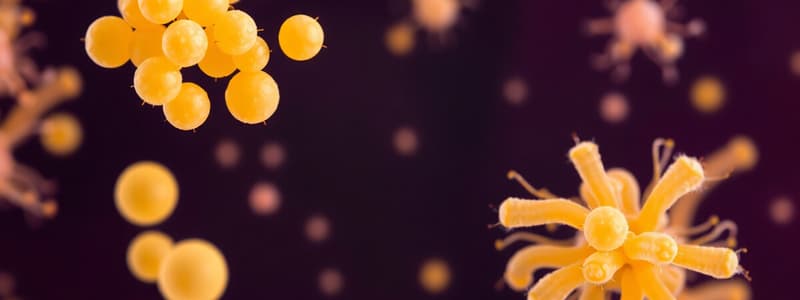Podcast
Questions and Answers
Which characteristic most accurately differentiates Staphylococcus epidermidis from other common skin flora?
Which characteristic most accurately differentiates Staphylococcus epidermidis from other common skin flora?
- It constitutes the predominant aerobic species on the skin. (correct)
- It is only found in the perineum.
- It is typically pathogenic in immunocompetent individuals.
- Its primary habitat is the nares.
In what scenario would Staphylococcus aureus, a component of normal human flora, most likely present a pathogenic risk?
In what scenario would Staphylococcus aureus, a component of normal human flora, most likely present a pathogenic risk?
- In an individual with a healthy, intact immune system.
- During routine hand washing with antibacterial soap.
- Following a superficial skin abrasion in a immunocompetent individual.
- In a patient undergoing chemotherapy with a compromised immune system. (correct)
How does the concept of 'commensalism' apply to the normal human microbial flora?
How does the concept of 'commensalism' apply to the normal human microbial flora?
- The microorganisms neither benefit nor harm the host under normal circumstances. (correct)
- The microorganisms actively compete with the host for nutrients.
- The microorganisms always provide a benefit to the host.
- The microorganisms invariably cause disease in the host.
A patient undergoing treatment for a severe burn wound develops a secondary infection. Cultures reveal a species typically found as part of the normal skin flora. Which of the following factors most likely contributed to this organism becoming pathogenic?
A patient undergoing treatment for a severe burn wound develops a secondary infection. Cultures reveal a species typically found as part of the normal skin flora. Which of the following factors most likely contributed to this organism becoming pathogenic?
Which of the following statements accurately describes the role of normal microbial flora in human health?
Which of the following statements accurately describes the role of normal microbial flora in human health?
Flashcards
Normal Microbial Flora
Normal Microbial Flora
Microorganisms that live on or in the human body without causing harm under normal conditions.
Normal Flora's Role
Normal Flora's Role
They can help, harm, or coexist without affecting the host.
Flora in Compromised Hosts
Flora in Compromised Hosts
Harmless in healthy individuals, but can cause disease in compromised hosts.
Staphylococcus epidermidis Role
Staphylococcus epidermidis Role
Signup and view all the flashcards
Micrococci's Presence
Micrococci's Presence
Signup and view all the flashcards
Study Notes
- Normal human microbial flora includes microorganisms that can aid, harm, or exist as commensals within a host.
- These organisms are typically harmless in healthy individuals but can cause disease in compromised hosts.
- They inhabit the human skin, nails, eyes, oropharynx, genitalia, and gastrointestinal tract.
Normal Flora of Skin
- Staphylococcus epidermidis is the predominant inhabitant of the skin, constituting over 90% of the resident aerobic flora in some areas.
- Staphylococcus aureus is commonly found in the nose and perineum.
- Micrococci are less common than staphylococci and diphtheroids but are frequently present on normal skin.
Studying That Suits You
Use AI to generate personalized quizzes and flashcards to suit your learning preferences.




